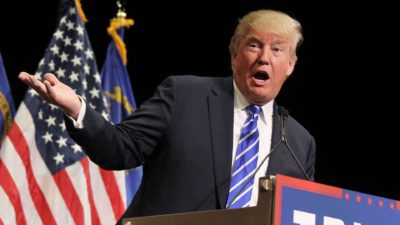 Republican candidate in the forthcoming Presidential election in the United States of America, Donald Trump has threatened to suspend Nigerians and other nationals that are contending with terrorism from entering America if he wins and become the next President.
Republican candidate in the forthcoming Presidential election in the United States of America, Donald Trump has threatened to suspend Nigerians and other nationals that are contending with terrorism from entering America if he wins and become the next President.
He stressed that for America and its allies to defeat Islamic State (IS) and other global terrorism, there is need for the United States to wage an unrelenting ideological fight, comparing the modern day terrorism to the Cold War era.
He vowed to temporarily suspend immigration from “the most dangerous and volatile regions of the world” and judge allies solely on their participation in America’s mission to root out Islamic terrorism.
In a speech at Youngstown State University in Ohio, a critical swing state where polls show him trailing Hillary Clinton, Trump combined old vows to seize Middle Eastern oil fields with the announcement of a series of new, if still vague, proposals to change America’s battlefield tactics.
“Just as we won the Cold War, in part by exposing the evils of communism and the virtues of free markets, so too must we take on the ideology of radical Islam,” he said.
He again tried to change his politically inflammatory approach to immigration, replacing his 2015 vow to bar Muslims from entering the United States with a new commitment to bar anyone from parts of the world where terrorism breeds.
Once again, he did not name those countries, or say whether citizens of longtime allies where terrorists have plotted and executed attacks — Germany, France and Belgium among them — would be included.
Trump, who has pledged to build a wall along the border with Mexico, also said he would call for “extreme vetting” of immigrants that would include requiring them to respond to a questionnaire with an “ideological test.”
Over all, he appeared to be arguing for the kind of terrorism-centric foreign policy that President George W. Bush adopted after the September 11, 2001, attacks.
But over time, that approach ran into complications: China and Russia used the fight against terrorism to crack down on Muslim minorities. And the Bush administration eventually discovered that a one-dimensional approach, measuring countries almost exclusively on their commitment to fighting Islamic terrorists, left it little leverage when their partners in counter-terrorism took other steps opposed to American interests — from the Chinese claiming portions of the South China Sea to increasing Russian threats against former Soviet states.
Monday’s speech represented another attempt by Mr. Trump to focus on issues after a rocky period in his campaign, much as he did last Monday with a speech on the economy.
He laid the blame for the rise of Islamic extremism on President Obama and Mrs. Clinton. He said they made “a catastrophic mistake” in “the reckless way in which they pulled out” of Iraq. He charged that Mrs. Clinton compounded the error by attempting to “build a democracy in Libya.”
He argued that Mrs. Clinton had been a vocal proponent of the American intervention in Libya in 2011, which Mr. Obama has repeatedly acknowledged was the most ill-thought-out foreign policy move in his nearly eight years in office. He also charged that “Hillary Clinton wants to be America’s Angela Merkel,” a reference to the German chancellor.
Germany has taken in tens of thousands of refugees fleeing the civil war in Syria, in which fighting between forces loyal to President Bashar al-Assad, rebels opposed to his rule and Islamic State jihadists has claimed 400,000 lives.
Trump offered no criticism of Mr. Assad, but criticized the Obama administration for advocating the removal of the Syrian leader and Hosni Mubarak of Egypt, who was deposed in the first blush of the Arab Spring, because doing so took out the strongmen who kept the lid on violence in the region.
He pledged to form a new partnership with Israel, Egypt and Jordan to try to stop the spread of terrorism, including groups such as Hamas and Hezbollah. He also suggested that the United States would be well served by joining forces with Russia against the Islamic State. [myad]






